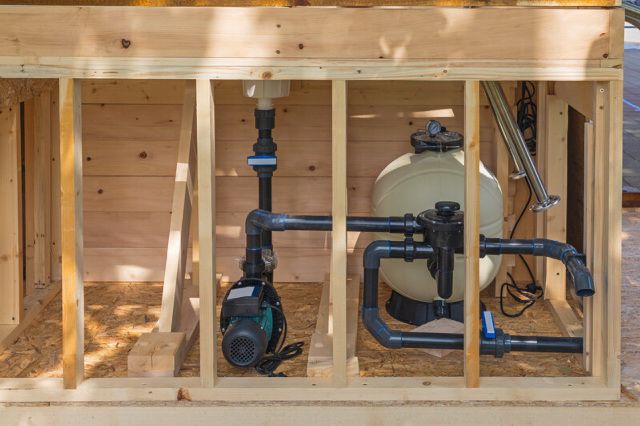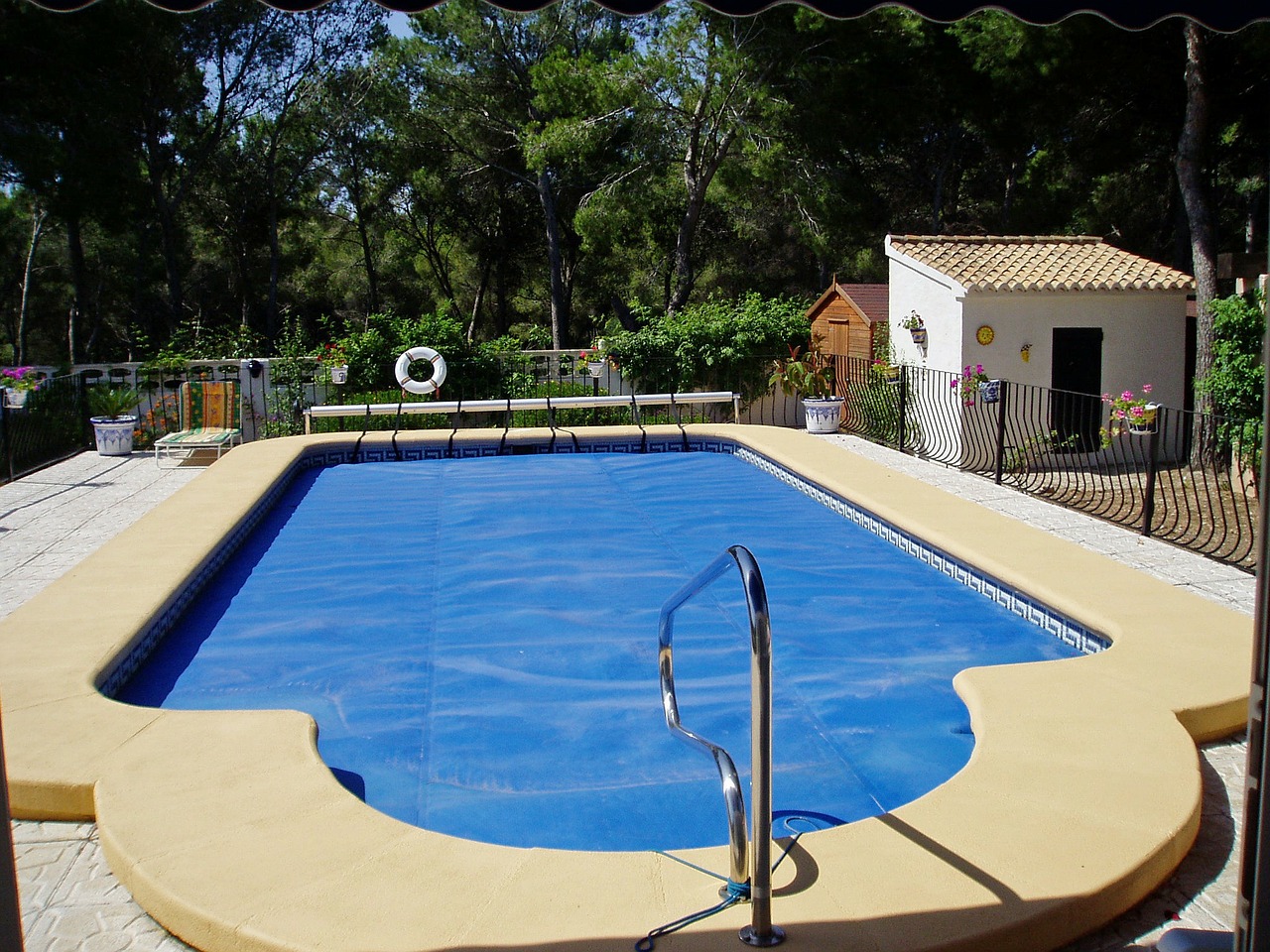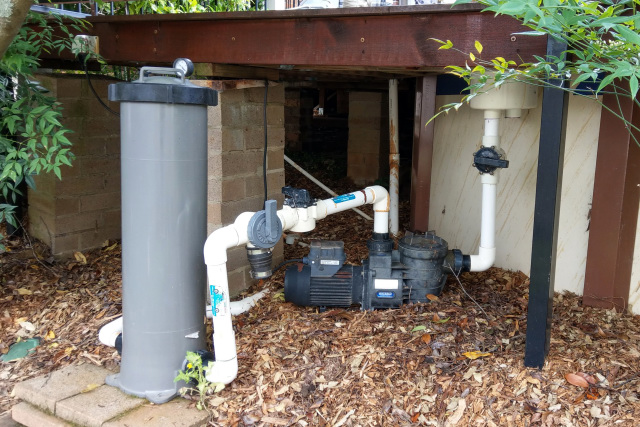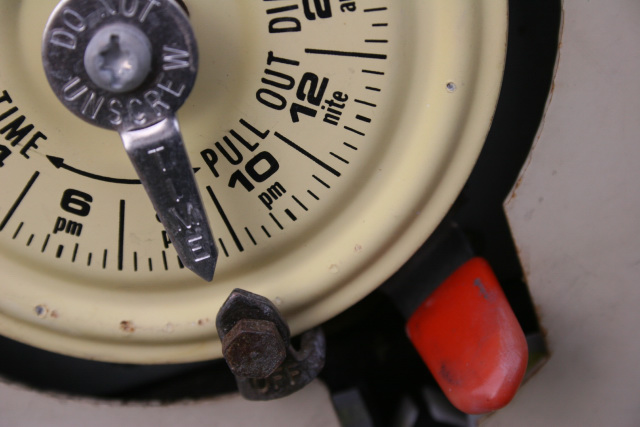Pool pumps are an important part of any successful pool maintenance routine. They help to keep the water in your pool clean and clear.
But the question remains, how often and how long should you run your pool pump? You’re not alone if you don’t know the answer to this question. In this article, we’ll give you a full guide on how many hours you need to run your pump, whether that’s summer or winter.

Article Contents
How often should you run your pool pump?
You should run your pool pump and filter at least once a day to ensure you get proper filtration. Whether you have an inground pool, permanent above ground pool or portable above ground pool like an Intex, Summer Waves or Best Way pool, you’ll want to run your pump daily and on average for 8 hours.
Water gets contaminated very easily. So, your pool water builds up with more and more dirt and bacteria every day, and the longer you wait to filter, the dirtier it gets which will increase the need for more chemicals like chlorine.
Indoor Pool Pump Running Time?
If you have an indoor pool, you can run the pump once every one to two days, as the indoor environment usually gets less dirt and debris. But it does depend on the regularity of your usage. So, if you’re constantly using the pool, we definitely recommend running the pool pump once every day, whether it’s indoor or outdoor.
What if I Have a Pool Cover?

If you’re using a pool cover on your pool, you’ll still need to run it everyday however you may be able to cut down the number of hours you run the pump.
e.g you may run the filter pump for 6 hours instead of 8 hours when using a swimming pool cover. The pool cover will keep out a lot of the dirt, debris and contaminants.
Again, it does depend on the regularity of your usage. If you use your pool everyday then you should run your pump every day.
How long should you run your pool pump?
On average, a pool pump should run for at least 8 hours a day for efficient filtration. The running time of your pump will vary based on different pool sizes, how often you use the pool, how much debris enters your pool and your pump’s flow rate.
The amount of time a pool pump should run for is determined by the time it takes the pump to completely cycle your pool water (turnover rate).
The longer you’re running a pool pump, the longer it’ll run water through the filter, and the more dirt and contaminants will be filtered. But running your pool pump 24/7 is obviously not the most realistic approach. It’ll push your electricity bill through the roof, and we don’t want that.
That’s why you should use a pool pump timer, like an Intermatic timer, to automatically switch the pump on and off.
The Effects of Pump Flow Rate
Flow rate is how much water your pump can move per minute. When you run your pump it’s optimal to cycle all the water through the pool’s filter at least once (if not 2-3 times per day). The flow rate of your pool pump will determine how long it takes to filter or cycle all the water in your pool and therefore how long to filter or run your pool pump for.
To work out how long it takes to cycle (turnover) the water, divide your pool’s volume by the flow rate of your pump. The flow rate of a pool pump is written on the pump’s specifications.
This equation will help you to easily calculate exactly how long you should run your pool pump every day.
Pool Water Turnover Rate (mins) = Pool Water Volume / Pump Flow Rate (mins)
e.g. if your pool volume is 20,000 gallons (76,000L) and you’re using a pool pump with 55 gal (208L) flow rate per minute, the time it takes to filter through all the pool water will be:
20,000 gal /55 = 364 minutes (6 hrs)
Or in litres it would be 76,000L / 208L
So, this pool pump should run for at least 6 hours every day to cycle through and filter all of the water But it doesn’t end there as you will not likely filter all the water by only filtering 20,000 gal (76,000L). In reality you’ll need to turnover (filter all the water) 2 or more times.
It’s very important to know exactly how long you should run your pool pump. Otherwise, it will unnecessarily increase your electricity bill or you may not filter the water enough to maintain the water quality.
How Do Your Work Calculate Pool Volume?
The volume of your pool can be calculated by the following formula:
Square Pool Volume = L x W x average depth Rectangular Pool Volume = L x W x average depth Circular Pool Volume = Pi x R Squared x average depth L = Length W = Width R = Radius *Measurements are in feet or use meters if you use metric.
The above formula will help you work out the volume of your pool in cubic feet. But what is the volume in gallons? There are 7.48 gallons per cubic foot. So to calculate the volume in gallons divide the volume you calculated by 7.48 (or rounded 7.5). You now have the volume in gallons.
To calculate your pool’s volume in litres, take your measurements in meters, calculate the volume using the above formulas then multiply by 1,000. You now know how many litres your pool holds.
Once you know your pool’s volume and your pool pump’s flow rate, you can easily calculate how long your pump should run every day using the formula above. Here it is again in case you missed it the first time:
Pool Water Turnover Rate (mins) = Pool Volume / Pump Flow Rate (mins)
What Other Factors Affect Ideal Filtering Time
It’s not just the turnover rate or time that it takes to filter all your pool water you should consider. There are other important factors too such as environmental conditions, the season and how often you use your pool.
In case of rain or storm, your pool would get more dirt and bacteria than usual. During such conditions, you will need to run your pool pump for longer. Try an additional couple of hours.
It’s very important to understand that each pool requirement is very different. You might be in a location where there’s not so much dust and pollen. A good idea is to go by eye. If your pool water is sparkling and the chemistry levels are balanced, then try reducing the filtering time by 1 hour.
Similarly, if the water looks very dirty, green or cloudy, try running your pool pump for an additional hour or two. You’ll need to experiment to find the ideal time you need to run your pool’s pump.
And if you have algae, the amount of time you run your pool’s filter and pump should be 24 hrs per day until you clear it.

When Should You Run Your Pool Pump?
You can run the pump at any time of the day. It’s a good idea to run the pump during the day when people are swimming in the pool. So, the water gets filtered and remains clean while you’re using it.
However, running the pool pump at night will save you more money. Why? Keep reading to find out.
Best time of day to run a pool pump?
As we’ve discussed earlier, you can basically run your pool pump at any time of the day. But it’s definitely more efficient to run it at night. Here’s why:
- Electric companies charge less for electricity consumption during non-peak hours, which is usually between 9 pm to 8 am.
- You’ll generally be using a lot of household utilities during the day, such as air-con, oven, television etc. So, using the pool pump during the day will cause more voltage intake.
- If you run the pool filter at night, you’ll have a sparkling clear pool in the morning. You won’t have to wait for the water to clean out before diving in for a swim.
- It’s also best to add chemicals at night and when you add chemicals to your pool, you’ll need to run your pool pump to circulate and mix them.
Another option is to split up when you filter your water. It doesn’t need to be in a continuous block. You may run it for 50% of the time during the day and the other 50% at night.
For a detailed look at this, check out our article:
Is Night Or Day Best To Run a Pool Pump? Plus Other Tips
Do seasons affect how long to run a pump for?
Seasons do affect how long you need to run your pool’s pump. For example, you’ll be using the pool more in Summer so will need to run your pump longer.
Here’s a breakdown of how different weather requires different runtime from your pump.
Summer: During summer, you can just run your pool pump based on its optimal run time requirement.
If your area has a very dry summer such as Los Angeles, the amount of dirt and pollen in the air will increase. So, you’ll need to run the pump for a bit longer than its optimal time for better filtration.
Rainy Season: Rain will always make your pool water dirty, bringing in more dirt, debris, and bacteria. So you’ll need to run your pump more than once a day. A good idea is to run the pump during and after the rain has stopped.
If your area gets constant rain, then you may need to continuously run the pump to help keep the water clear. Don’t run your pump in an electrical storm though.
For more on this and why you shouldn’t run your pump in an electrical storm, check out our article: Should You Run Pool Pump When Raining or in a Storm?
Winter: Most people tend not to use the pool during the winter. If you’re one of them, then reduce the time you run your pump to just 3-5 hours per day.
It’s a good idea to continue filtering your water and keep the pool balanced during the winter otherwise you may end up with a swamp. It’s always easier to maintain your pool rather than try to fix problems.
But if you plan on using the pool during the winter, you’ll need to run the pump every day for a longer period of time. When the temperature drops below 35°f (1.6°c), the pool pump needs to run constantly to reduce the chance of freezing. If temperatures get down to 30°f (-1°c) you should close your pool for the season.
Does Location Affect How Long to Run Pump For?
Location matters a lot when it comes to the runtime requirement for a pool pump. If you’re in locations such as California and Florida where summers are long and dry, run the pool pump for 5-8 hours depending on the volume of your pool.
Florida often gets the wild windy weather. South Africa also has a similar climate, where there is often desert wind and scorching hot summer. Look out for those weather conditions, and run the pool pump for a longer time, as the pool water will get dirtier than usual.
Texas has a very muggy and hot summer. So, the weather will often be very sweaty and dusty. For such locations, it’s a good idea to run the pump for a bit longer than its optimal runtime.
For locations such as New York, that have a lot of pollution, it’s advisable for the pool pump to run for a longer period of time, maybe 7-10 hrs per day. However, if you’re in a location like Australia, where the air quality is very good, you can just consider running the pool pump for its average optimal run time every day – maybe 6-8 hrs.
It also matters where your pool is located. Pools that are surrounded by a lot of large trees will get dirty quicker because of shredded leaves and pollen. In those cases, the pump has to run for a longer time.

Is it ok to run a pool pump 24 hours a day or continuously?
Yes you can run your pool pump continuously for 24 hours. It’s ideal actually and it doesn’t harm your pool or the pump. But it’s a costly approach if you’re only using a single speed pump. Your electric bill will likely go off the roof.
For example if you went from running your pump 8 hours a day to 24 hours per day, your power bill for the pump will go from about $260 per year to over $800 per year (that’s based on a small pump with low to average power costs).
If you want to work out how much it costs to run your pump, check out our article:
How Much Are Pool Pump Running Costs? (Cost Calculator)
But if you don’t mind paying the extra bill, then why not? You’ll have a clean pool all day long.
Should I run my pump every day?
It’s optimal to run your pool pump at least once every day. It helps you get better filtration for your pool water and will keep the water clean. But it also depends on your usage of the pool and environmental factors. If you’re not using the pool frequently every week, then you can consider running the pump less.
Final thoughts
To sum it up, on average you should run your pool pump for 8 hours every day for efficient filtration. Take the weather conditions of your location into consideration. If you have a lot of rain, pollution, and dusty weather in your location, you’ll have to run the pool pump for a longer time. You can definitely run your pool pump at any time, but running it at night will save you some extra electricity bills.

